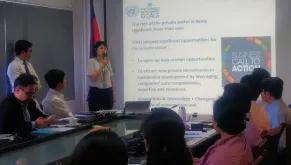As Partnership and Innovation Specialist with the Office of the UN Resident Coordinator in Cambodia, Mihoko Yotsui (Japan) played a significant role in mobilizing resources and expertise to support localization of the Sustainable Development Goals (SDGs).
Mihoko joined the Resident Coordinator's Office in April 2018, serving through the Global Human Resource Development Programme for Peacebuilding and Development (HRD) of the Government of Japan.
She supported bringing together different UN entities to improve the efficiency and effectiveness of activities at the country level. To do so, she developed strategies and activities to actively involve the private sector in development.
In partnerships, Mihoko supported the UN country team with private sector engagement, innovation and the implementation of the SDGs. Furthermore, she facilitated communications on partnership innovation and SDG implementation.
During my assignment, I supported the formulation of harmonized internal guidance for engaging with the private sector. In doing so, I considered ethical perspectives, transparency requirements and funding mechanisms.
Mihoko worked with a diverse set of stakeholders including private sector associations, business platforms including social entrepreneurs and NGOs, as well as several UN agencies.
"We worked together to discuss how we could collaborate better and create mutual values. We also raised the technical expertise of UN partners with regards to the implementation of the SDG framework.
“Knowledge sharing was very important. I organized three learning sessions for UN staff and one consultation meeting with the private sector. The latter aimed at demystifying misconceptions held on both the UN and the private sector," Mihoko says. "For UN staff, I believe it helped them transcend the donor-recipient mindset with regards to private sector involvement. It also allowed the private sector to see the value proposition of the UN in each context. We uncovered what mutual values both sides share, which can help facilitate more efficient and effective outcomes," she explained.
Mihoko felt that being part of the Resident Coordinator's Office helped her to understand the global UN mandate and that of many of its organs and bodies, as well as operations at country level. Mihoko ended up supporting several UN entities and worked with over 40 private companies and business associations while on assignment.
"The business landscape in Cambodia is unique, and requires a different approach to different groups – micro, small and medium enterprises make up over 97 per cent of enterprises. Large enterprises make up 0.6 per cent and create 63 per cent of jobs, and generate 76 per cent of the total turnover.
"Based on this, I applied different approaches. For micro, small and medium enterprises, the major issues to address are still human rights in the workplace and supporting access to funds and policy discussions. For large enterprises, they see the UN as good branding opportunity, and some are ready to contribute to society through their business activities. Another entry point was supporting them to introduce sustainability reporting."
"Since my role required designing work on my own, it enhanced my skills to be a self-starter. Coordination is another skill I learned through my assignment. I valued the opportunity I had to understand people’s different views, values and conflict of interests and guide them to agree on common values and accomplish joint same goals," Mihoko concludes.

